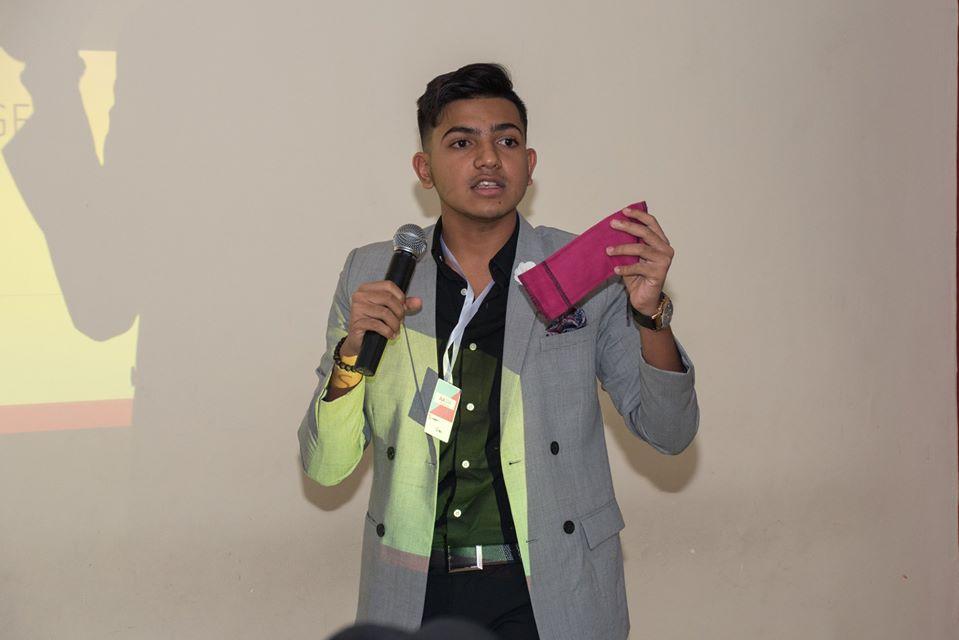It is not ordinary for a 20-year-old school graduate to have achieved so much in a short period. However, for Ziyaan Virji, he not only leads in philanthropic endeavours but also is developing a social enterprise that looks at the menstrual health of women.
For the last two years, Ziyan, a graduate of the Aga Khan Academy Mombasa, has been working closely with communities both in Kenya and Tanzania as well as using proceeds of the Princess Diana Award to push for the welfare of the less privileged while still maintaining a social enterprise.
At just 17, he founded the non-profit Affordable and Accessible Sanitation for Women (AASW). This came about as a personal project for his Middle Years Program (MYP), where his research led him to find out that barely 2% of school girls in urban areas in Tanzania could afford sanitation pads and had to miss school during their period. He concluded that in finding a solution to this issue, his project’s goal would be to create cost-effective and reusable menstrual pads for women who lack access to sanitary hygiene in Tanzania and Kenya. Thus was born AASW which has distributed affordable menstrual materials to over five thousand women and school–going girls.
This project would go on to receive major international recognition including the Princess Diana Award for going above and beyond his everyday life to create and sustain positive change. The Award, which celebrates its 20th anniversary this year, is considered one of the highest accolades for social action or humanitarian efforts that a young person can receive.
“It definitely is very common for Aga Khan Academy students to develop entrepreneurial skills. This is because from the Primary Years program to the Diploma program we are nurtured with the value of leadership and stewardship from the academy and the IB,” Ziyaan tells The Exchange.
Ziyaan has since partnered with several organizations to improve access to sanitary health. Through Operation Period, the organization has helped over 1,000 girls to acquire access to menstrual hygiene across six different countries, including Kenya, Tanzania, Pakistan, India, Nigeria and the UAE.
Since 2014, May 28th has been recognized as Menstrual Hygiene Day, a day to bring awareness to menstrual inequity.
Ziyaan has now partnered with fellow graduates of the Aga Khan Academy Mombasa to raise funds towards contributing to the annual scholarship kitty at the Academy, which targets students from poor backgrounds.
Under the #DoMore2020 Campaign, the team has raised $57,677 (115% of initial goal) for deserving students around Africa to get a life-changing quality education at The Aga Khan Academy Mombasa.
“It is definitely unique for a graduating class to do this especially because the Class of 2020 went through so much during this pandemic. From cancellation of our final examinations to not having a graduation and abrupt goodbyes, it truly has been an unprecedented year,” he says.
However, they viewed this as a unique way of celebrating and what was happening around the world with the pandemic really motivated them to #DoMore. Started in May and ended in June, #DoMore2020 has received donations from people in East Africa, the Middle East, Europe, South Asia and North America.
The money raised will directly go to the Annual Scholarship Fund at the Academy which provides full and partial scholarships for students to attend the Academy regardless of their socio-economic background via the Talent Identification program and Financial Aid program.
“During our time at the Academy, we have been nurtured with skills, values and ethos in a culture of giving back to our society and this campaign was the best way for us to act upon and showcase that. We are hoping to create a legacy at the Academy in which each graduating class does more and always pays forward what they have received.”
Ziyaan notes that it has not been easy running a successful social enterprise, a common occurrence that meets most of start-ups and especially Small and Medium Enterprises (SMEs).
“Firstly, it is important to acknowledge how trivial a role SMEs have in the economy and the potential and room for growth this pandemic has brought us. My first advice for SMEs would be to create strategic partnerships with other organizations in your industry. As we adapt to the new normal it is difficult to make the transition and setting systems into place, but with strong partnerships you can easily overcome some challenges.”
He notes for example, during the Covid-19 period, his social enterprise has been able to increase the number of targeted users of his menstrual products ten-fold.
“This was because we invested in creating strategic partnerships with organizations in our industry. Additionally, SMEs should restructure and adapt to current trends and opportunities. This would include setting up an e-commerce platform and investing into digital and social media marketing through platforms such as TikTok and Instagram.”
He notes that Covid-19 has served as an opportunity for massive growth and has reminded us about the importance of social enterprises.
“Covid-19 has proven the importance of thinking of a business model that not only brings economic value but also social value. Investors are investing more into social enterprises as they are acknowledging the importance of sustainable business practices and consumers are consuming products/services that serve a greater purpose,” he adds.
He says light is being shed on a lot of problems and issues being faced and this just opens up more opportunity for growth in the social enterprise industry.
Africa’s sanitary pads market stood at $528 million in 2016 and is projected to reach $779 million by 2022. Various initiatives are taken by sanitary pad manufacturers, governments, and NGOs operating across various African countries, coupled with raising awareness about personal hygiene among females is expected to boost Africa’s sanitary pads market over the next five years. Moreover, rising demand for reusable pads, which are highly cost-efficient, is anticipated to further boost Africa’s sanitary pads market in the coming years.
